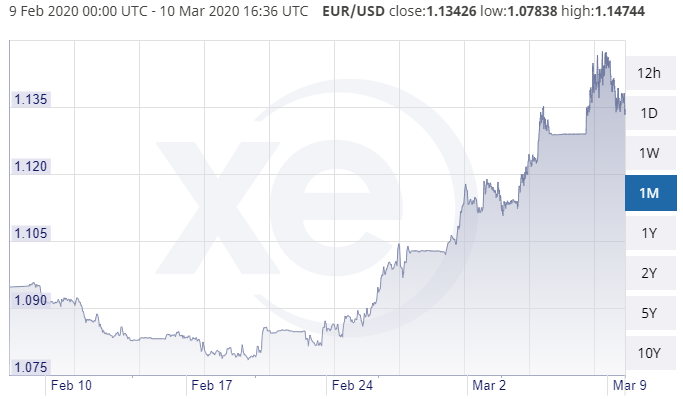| 17-03-2020 | Erna Erkens | treasuryXL
In this blog, our Expert Erna Erkens, discusses the past events and their consequential effect on currencies. Erna Erkens is owner of Erna Erkens Valuta Advies, a consultancy firm specialized in currencies.
After 35 years of work experience in the financial markets at 2 different banks, Erna wanted to work as a self-employed person. For many companies, the topic of “currency risk” is on the agenda, but often does not reflect the effect that currency movements can have on organisational results. Erna noticed that there is a great need within SMEs for knowledge and support with regard to currency risks, among other things. With EEVA, Erna shares her knowledge in different ways to meet this need.
(Blog is in Dutch)

EUR/USD: 1.1105 of andersom 0.9005 (gisteren 1.1235 of andersom 0.8900).
EUR/USD: Gisteren geen cijfers uit de Eurozone, maar wel een ingelaste vergadering van de EU ministers van Financiën. Uit de VS was gisteren de NY Empire State index veel lager dan verwacht en vorige maand. Vandaag de Ecofin vergadering en de ZEW index uit Duitsland en de Eurozone. Verder nog de kosten van arbeid en de productie uit de bouw van de totale Eurozone. Uit de VS de detailhandelsverkopen, de industriële productie, het gebruik van de capaciteit, de zakelijke voorraden, de openstaande vacatures en tot slot de NAHB huizenmarkt index. Maar de ogen zullen toch vooral op de financiële markten gericht zijn deze dagen. Alles is in mineur behalve de USD. Dus EUR/USD moest toch weer een cent prijsgeven gisteren. Als de vlucht naar de USD aanblijft houden kunnen we wel weer wat verder naar beneden. Tot de paniek over is. Toch zal dit gelimiteerd zijn door de verkleining van het renteverschil tussen de EUR en de USD. Dus als er maar een beetje vertrouwen terug komt zal de EUR/USD flink stijgen. Maar nu lijkt de USD nog een flinke veilige haven. Toch is de EUR/USD een stuk hoger sinds de laagste koers van 1.0790 van een paar weken geleden.
- GBP/USD: 1.2210 (gisteren 1.2345)
GBP/USD: GBP/USD blijft maar dalen. Gisteren geen cijfers, maar vandaag de cijfers van de arbeidsmarkt. De cijfers blijven uit het VK eigenlijk vrij goed, maar ja, daar trekt de koers zich op dit moment niets van aan. Wel goed voor de export. Dit helpt de economie van het VK wel. Het VK heeft een andere strategie om de coronacrisis te pareren. Ze doen eigenlijk soort van bijna niks.
- EUR/GBP: 0.9095 of andersom 1.0995 (gisteren 0.9100 andersom 1.0989)
EUR/GBP: Steeds meer een markt voor kopers van GBP. Vandaag cijfers van de arbeidsmarkt. Brexit is even op de achtergrond gekomen. Even iets anders aan de knikker.
- EUR/CNY: 7.8065 (gisteren 7.7995). USD/CNH 7.0125 (gisteren 7.0170), USD/CNY 7.0025: PBoC fixing: USD/CNY: 7.0094 (gisteren 7.0018).
EUR/CNY: Eigenlijk weinig nieuws. De beurzen iets lager, maar niet veel. Corona besmettingen lopen nog steeds terug.
Olieprijs
WTI Crude Oil: USD 29.58 (olie voor de VS, gisteren USD 31.12) Brent Oil: USD 30.08 (olie voor Europa, gisteren USD 33.66). Olie uit Shanghai Yuan 241.30 = USD 34.47 (contract is van april 2020). Het verschil tussen de Brent en de WTI Crude Oil is bijna helemaal verdwenen. Dat is best heel bijzonder. En dat is ook een teken voor mij dat de beweging bijna voorbij is. Maar de USD 50 komt niet zo snel terug. Pessimisten zien het naar onder de USD 20 gaan. Zou kunnen, maar ik ben minder pessimistisch. Maar de komende maanden lijkt Saudi Arabië de oliekraan vol open te draaien. Althans dat zeggen ze nu,maar dat kan zomaar weer veranderen. Als dat blijft zal er een gematigde stijging komen denk ik. Maar als er toch weer gesprekken met Rusland en overeenstemming zal zijn dan kan dit onmiddellijk weer helemaal omslaan. Ik acht dat ook niet onmogelijk. De opslag voor olie is nu schreeuwend duur. Ik denk dat we de komende tijd nog te maken houden met lage olieprijzen,maar dat dit wel op een iets hoger niveau zal zijn. Ik heb het al vaker gezegd, maar ik schat de ruimte om verder te dalen vrij beperkt in. Standard Chartered verlaagd zijn gemiddelde verwachting van de olieprijs voor de Brent van met -USD 29 maar USD 35 voor 2020.Ik ga mijn lange voorspelling ook naar beneden aanpassen volgende week. Maar niet zover denk ik. Het is alweer dalende.
Barrel / vat olie = 158.99 liter
Gallon = 3.7854 liter
Goud
USD 1483.0 (gisteren USD 1514.00). De goudprijs is in USD per troy ounce (=31.1 gram). Goud heeft zijn glans als veilige haven op dit moment helemaal verloren. Iedereen gaat voor cash. Dus is de USD,Japanse Yen, Zwitserse Franc in trek. En zelfs de Euro lijkt wat veilige haven glans te krijgen. De bodem van het goud lijkt overigens wel ongeveer bereikt. Cash is King!!! Maar dit zal snel weer terugkomen. Als de echte paniek wegebt of als je aan de nieuwe situatie wennen. Mooi moment om te kopen zou ik zeggen. Een analist sprak de woorden: De traditionele regels zijn op niet meer aan de orde en er is niets dat als een veilige haven kan worden geclassificeerd. Zelfs het goud niet. Dat komt snel weer terug is mijn gevoel.
Zilver
USD 12.35 (gisteren USD 13.10). De zilverprijs is in USD per troy ounce (=31.1 gram). Zilver is helemaal in de kaartenbak verdwenen. Ongelofelijk. Zilver op een laagterecord sinds 2009. Ongelofelijk. Wat voor het goud geldt is voor het zilver nog meer van kracht. Wat een koopje. iedereen komst echt wel weer bij zinnen. Dan zal het zilver weer snel stijgen, Maar dit is wel een enorme klap. die had ik niet eens een beetje aan zien komen. Tja.. Ik kan me een turbo of call optie goed voorstellen.
Beurzen gisteren en vanmorgen
De Europese beurzen zijn gisteren gemiddeld -4.2% lager gesloten. De AEX is gisteren -3.10% lager gesloten op 419.83. De AEX is vanmorgen 3.6% hoger geopend op 431.65. Weer bijgekocht gisteren. De beurzen in de VS zijn gisteren gemiddeld -12.5% lager gesloten. (Dow Jones, Nasdaq en S&P). Azië: De Japanse Nikkei is vanmorgen 0.06% hoger gesloten. Chinese beurzen zijn vanmorgen gemiddeld -0.5% lager gesloten. De beurs in Hongkong is vanmorgen 0.85% hoger gesloten.
En verder…
Trump
In deze tijd komt echt leiderschap naar boven. Ik zie op de tijdlijn op twitter van Trump alleen maar geretweete berichten. Een soort doorsturen. En het eerste bericht op Twitter van hemzelf gaat over de journalisten van The Times. Tja… Verder terug op de tijdlijn roept hij Amerikanen op elkaar te steunen en geeft hij aan dat er genoeg voedsel is in de supermarkten voor iedereen. Hij is positief over de beurzen. We gaan na de crisis de beste beurzen ooit zien. Dat is makkelijk voorspellen na een daling van 30%. En tot slot nog goed nieuws. Hij zal de luchtvaart en bedrijfsleven steunen. Dat geeft rust op de beurzen zo lijkt het.
Centrale Banken
Gaat Rusland de rente verhogen om de Roebel te ondersteunen? Zou bijzonder zijn in deze tijden van renteverlagingen. Turkse Lira’s ook helemaal in de kaartenbak. Zweden gaat ook weer verruimen door de aankoop van obligaties.
Diversen
Als het er echt op aan komt, willen mensen toch nog steeds cash geld hebben en is de USD nog steeds in trek, samen met de Japanse Yen en de Zwitserse Franc en in mindere mate de EUR. Ik vind de woorden van de Europese Ministers wel groot, maar nu de daden nog. Het gaat allemaal traag. de FED is daar wel beter in. Dat heeft niet met Trump te maken overigens. De FED/overheid in de VS heeft totaal USD 2200 miljard beschikbaar gemaakt. Dit is voor 330 miljoen inwoners ongeveer. Dat is USD 6.666.67 per inwoner. Wat stellen wij daar als Europa tegenover? En met welk tempo?
10 jaars rente
Bund contract: 171.40 (contract per juni 2020, gisteren 172.49). Een verschil van 0.15 punten in de Bund is ongeveer 0.01% in de 10 jaars IRS (Bund omhoog = lange rente omlaag en vice versa). De Bund is de meest verhandelde langlopende Duitse obligatie en geldt als leidraad voor de obligatiemarkt en IRS prijzen. De IRS prijzen zijn de basis voor onze hypotheekrentes. De lange blijven ineens stijgen. De rente in de VS is met 1.5% verlaagd en de lange rente’s stijgen? Raaarrrrr
10 jaar Staats Duitsland -0.41% (gisteren -0.48%). Verschil met VS 1.24%.
10 jaar Staats Nederland -0.08% (gisteren -0.22%) Verschil met VS 0.91%.
2 jaar Staats VS 0.40% (gisteren 0.38%) Verschil met 10 jaars VS 0.47%.
3 maands rente VS 0.27% (gisteren 0.25%). Verschil met 10 jaars 0.60%.
10 jaar Staats VS 0.83% (gisteren 0.85%)
10 jaar Staats VK 0.51% (gisteren 0.41%) Verschil met VS 0.32%
10 jaar EUR IRS -0.05% (coupon 6 maanden en 30/360). Gisteren -0.08%
Source

Erna Erkens
Owner at Erna Erkens Valuta Advies (EEVA)










